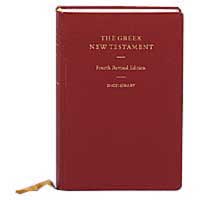Elementary Greek 101 102
For Dr.
Lorin L. Cranford
Professor of
Religion
Office: Lindsey
Hall 232
Last revised: 8/21/06
For Dr.
Lorin L. Cranford
Professor of
Religion
Office: Lindsey
Hall 232
Last revised: 8/21/06
The fall semester will concentrate on building sufficient skills of vocabulary and forms to facilitate meaningful involvement in the Greek text of the New Testament. The spring semester will be divided between further study of the grammar and translation of representative passages of the Greek New Testament.




Students not having the written exercise ready to be graded by the class period when it is due are expected to take a cut from that class period. Coming to class, copying the answers and then turning in a late paper constitutes cheating! Papers thus turned in will receive no score.
Grading of Weekly Quizzes and Written Exercises: . Accents and breathing marks count for 1/4 error per word. W.E. papers may be graded in class on date due by another class member without penalty points. Quizzes and W.E. papers turned in without a grade recorded in the appropriate location will have 10 points deducted from the grade.
Late Written Exercises may be turned in
electronically. This can only be done through attaching the document file
to the Assignments Turn In form located in Online
Forms at Cranfordville.com.

The adjusted average of the above numerical grade will then be converted into a letter grade according to the following curve: A = 90-100; B= 80-89; C = 70-79; D = 60-69; F = below 60. The numerical grades are not rounded off; see example below.
Note the following illustration of the above:
| Grade Sources: | Fall Sem. | Spr. Sem. |
| Exam 1 | 15% | 12.9% |
| Exam 2 | 15% | 12.9% |
| Final Exam | 15% | 12.9% |
| W.E. Avg | 15% | 12.9% |
| Quiz Avg | 15% | 12.9% |
| Paper | ---- | 12.8% |
| Class Recitation | 15% | 12.7% |
| Class Participation | 10% | 10% |
| Semester Avg: | =100% | =100% |
| Semester Grade: | . | . |
After each major exam, at mid-term, and before the final exam, each student will receive via e-mail an individualized Grade Report listing his/her grades and the semester average to that point in the course, as well as the class averages. Information about the semester grade or final exam will be available from the professor's office soon after the final exam in the form of Grade Report Five.
University Policy
for an Incomplete Grade:
An ‘I’ grade may be assigned only when
a small amount of coursework (i.e., test, project, research paper, or final
exam) is not complete. The student should contact the professor about the
possibility of an “I” grade. The reason for the incomplete work must
be of a serious nature and must be beyond the student’s control. The assigning
of an ‘I’ grade must be accompanied by the completion of an ‘I’ Grade contract,
with one copy given to the student, one kept on file by the professor,
and one submitted to the Associate Provost within seven days after grades
are submitted. The student must complete the coursework by the date provided
by the professor. The professor should submit the change of grade form
no later than 90 days after the last day of the term in which the ‘I’ grade
was assigned, or earlier, as indicated on the form.
Students are expected to adhere to the university Honor Code that is a condition of enrollment at Gardner-Webb University. See the current Student Handbook under the section Student Guidelines, Expectations, and Rights for the details of this policy.The GWU Student Handbook defines these actions as follows on pages 50-51. Read them carefully, because they will be enforced to the limit in this class.
"Definition of Academic Dishonesty:
Academic Dishonesty is the deliberate and knowing misrepresentation of one's academic work. A student is dishonest when two circumstances occur: (1) The student could reasonably be expected to know that his/her professor would disapprove of some aspect or circumstance of the student's academic work; and (2) the students submits work to the instructor for evaluation while hiding that particular aspect or circumstance from the instructor. To do so is clearly dishonest because the instructor will evaluate the work as what he/she understands it to be. The student has deceived the instructor by misrepresenting the work, and the evaluation has not been rightly earned. From another perspective, academic dishonesty may be viewed as the use of unauthorized assistance in any work which is to be evaluated--"unauthorized" meaning that the professor would not approve of the form of assistance received and is unaware of its use. The student is being dishonest if he/she deliberately hides this assistance from the instructor while knowing the instructor would not approve of this assistance. If the instructor is unaware of the assistance that has been received he/she will evaluate the work as being entirely the student's own. Thus, the evaluation has not been fairly earned by the student. Furthermore, any student who knowingly gives unauthorized assistance is also guilty of academic dishonesty. On tests and examinations academic dishonesty occurs when a student receives any assistance that the professor has not expressly permitted. It may take the form of looking on another student's test paper or bringing into the test site any information or materials not expressly permitted by the professor. Both of the above definitions of academic dishonesty apply: The student has misrepresented the test as being entirely his/her own work. Furthermore, the student has received unauthorized assistance.
On research papers, reports and other written assignments a form of academic dishonesty is plagiarism, which is the use of someone else's information or exact words without properly "documenting" or identifying that source. Whenever someone else's exact words are used those words must be properly punctuated as a quotation and the source fully identified. Also, any information or ideas which have been taken from a source other than the student's own personal knowledge – book, article, interview, etc. – must be properly documented, even though the student may be rephrasing the information in his/her own words. A student should not hesitate to consult the professor about any question or uncertainty regarding proper documentation of research information. A professor may often allow and even encourage students to work together on assignments or receive assistance from other students, other faculty members, other university staff members, friends, family or others. However, if the professor has not expressly allowed such assistance and expects the assignment to be done entirely by the student, to do otherwise would be dishonest. The student should consult the professor if there is any doubt about outside assistance being allowable....The examples above are not intended to be a full list of cases of academic dishonesty, but they illustrate the definition. Ultimately, academic dishonesty amounts to deliberately hiding something from the professor. So the best advice is this: Whenever in any doubt, consult the professor."
In addition to the bringing of charges against the student for academic dishonesty and plagiarism as outlined in the paragraphs following the above quote in the Student Handbook, the university authorizes each professor to set additional policies not less strengent, but more strengent than the above stated policy. In this class, the following policy will be strictly enforced:The minimum penalty for cheating or plagiarism will be a zero for the work submitted. Violations of an egregious or repeated nature may, upon investigation, result in the offender's receiving an F grade for the entire course.Please remember that the purpose of an honor system is not to seek out cheaters, but to ensure the integrity of the hard work that each of you will be contributing to this course. Good, honest students deserve to have their hard work and preparation protected against the rare individual who hopes to slide by on someone else's efforts. Additionally, cheating ultimately undermines the value of everyone's degree in the job market place.
All students needing accommodations to participate fully in all class activities and to fulfill requirements of the class should notify me of the need as soon as possible. Persons must be certified as having a disability by the Noel Program for Students with Disabilities in order to receive accommodations.
Career Opportunities. The Career Services Office has marvelous services available to GWU students and alumni for job assistance. You need to get your resume posted with them and take advantage of the services Holly Sweat and her assistants provide. Career Servies is proud to announce that the majority of their resources can now be accessed via their website: www.careers.gardner-webb.edu. Upcoming events, career fairs, campus employer recruitment and the Jobs Bulleting are just a few of the resources available on the site. Be sure to take advantage of all Career Services has to offer. Contact the office at 704 406-4562, their web site at http://www.careers.gardner-webb.edu, or go by their office at Suite 204 in the Dover Campus Center.A new service now provided is the Bulldog Network, which helps find both jobs and internships. Click on here for information:
Class
Cancelation Notices.
When classes are canceled due to bad weather, you can find this information posted on GWU's web site or call 1- 877-GWU-SNOW. Additionally, area radio -- especially the university's radio station WGWG at 88.3 FM -- and TV stations will be notified of the closing. Very rarely will classes on the Boiling Springs campus be closed for bad weather.
Greek 101 classes will take place in Lindsey Hall (#5 on the map) room 304. The one exception is the first day of classes, when the class will take place in Dover Library (#49 on the map), computer lab. Greek 101 will meet in Lindsey Hall room 304 on Mondays, Wednesdays, and Fridays, 10:00 to 10:50 am.
In the event of the need to evacuate the building, the professor will immediately and quickly take roll (if not previously taken). Persons in the classroom will be directed in an orderly fashion to the nearest building exit (indicated by posting in the hallway). Persons will proceed to a gathering point previously designated by the professor (at last 300 feet away from the building). The professor will once again take roll at the designated gathering point. No one should enter the building until instructed by the University Police or other designated personnel on off-campus sites.